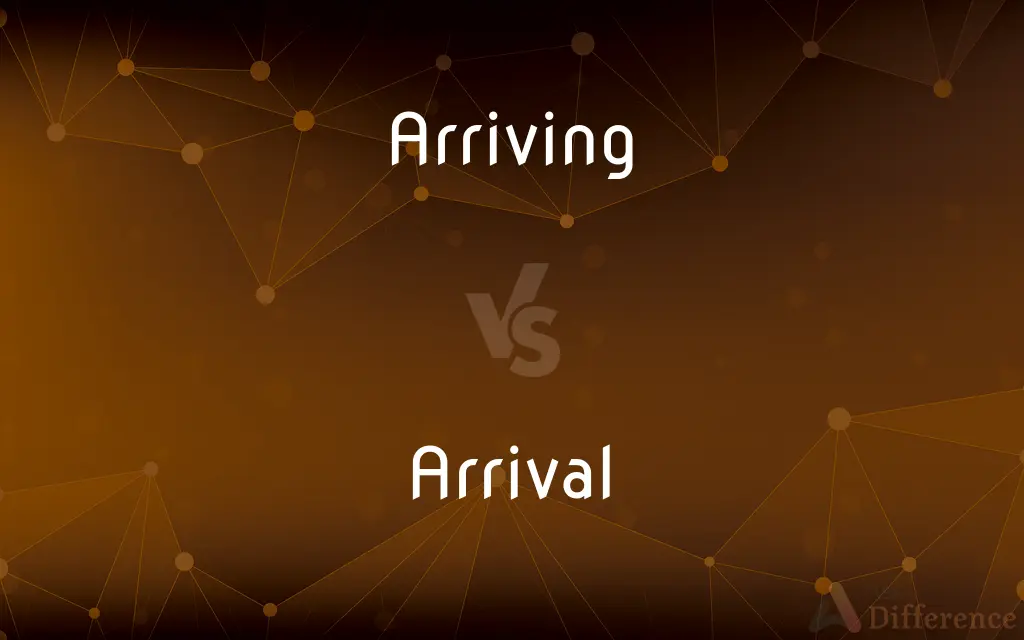Arriving vs. Arrival — What's the Difference?
By Urooj Arif & Fiza Rafique — Updated on March 30, 2024
Arriving refers to the process of coming to a place, focusing on the action and its progress, while arrival signifies the act of reaching a destination, emphasizing the conclusion of a journey.

Difference Between Arriving and Arrival
Table of Contents
ADVERTISEMENT
Key Differences
Arriving is the ongoing action of coming to a destination, highlighting the movement and approach towards a place. It captures the journey and its immediacy, often associated with anticipation and transition. Whereas arrival denotes the completion of a journey, focusing on the moment one reaches a destination, marking an endpoint.
Arriving emphasizes the temporal aspect of movement, suggesting an action in progress that is not yet completed. It conveys a sense of motion and direction, often used to describe someone or something that is in the process of coming to a certain location. On the other hand, arrival is used to signify the moment or instance when the movement towards a destination is concluded, often marked by a physical presence at a certain place.
The use of "arriving" often implies a dynamic process, incorporating elements of duration and anticipation. It's about the journey, reflecting ongoing actions and the fluid nature of movement. Whereas arrival crystallizes the transition from motion to stillness, capturing the significance of reaching a goal or destination, offering a sense of closure and fulfillment.
In terms of narrative and storytelling, "arriving" can add a sense of immediacy and build anticipation, suggesting a sequence of events leading up to a significant moment. It invites the audience to engage with the unfolding journey. Conversely, "arrival" provides a narrative conclusion, signaling the end of a journey and the beginning of a new phase, serving as a pivotal point in the story.
The perception of time and anticipation differs greatly between arriving and arrival. Arriving is associated with the future tense, indicating an action that will conclude at a later time. It's linked with expectations and the unfolding of events. On the other hand, arrival is often discussed in the past or present tense, emphasizing a completed action and the resolution of anticipation, focusing on the outcome of a journey.
ADVERTISEMENT
Comparison Chart
Definition
The action of coming to a place
The act of reaching a destination
Temporal Aspect
Ongoing, not yet completed
Completed, conclusive
Focus
Process and movement towards a place
Conclusion of a journey, reaching a place
Narrative Role
Builds anticipation, focuses on journey
Marks conclusion, starts new phase
Tense Association
Future, suggesting imminent conclusion
Past or present, indicating completion
Compare with Definitions
Arriving
Coming into existence or awareness.
A new era is arriving with technological advancements.
Arrival
Coming into existence.
The arrival of the digital age has transformed communication.
Arriving
Approaching a certain location.
Spring is finally arriving after a long winter.
Arrival
Reaching a destination.
The arrival of the flight is scheduled for noon.
Arriving
Being on the verge of a significant moment.
We are arriving at a crucial decision point in the project.
Arrival
Achieving a goal.
Her arrival at the top of the mountain was met with applause.
Arriving
Entering a phase or state.
He is arriving at a deeper understanding of the subject.
Arrival
The moment something begins.
The arrival of spring brings new life.
Arriving
Moving towards a destination.
The train is arriving at the station.
Arrival
The act of coming to a place.
The arrival of the guests made the house lively.
Arriving
Arriving is a studio album released in 2004 by Chris Tomlin. The album has received RIAA "Platinum" status and peaked at No.
Arrival
The act of arriving.
Arriving
To reach a destination.
Arrival
One that arrives or has arrived.
Arriving
To come at length; take place
The day of reckoning has arrived.
Arrival
The reaching of a goal or objective as a result of effort or a process
Our ultimate arrival at a compromise.
Arriving
To achieve success or recognition
He had finally arrived as a designer.
Arrival
The act of arriving reaching a certain place.
The early arrival of the bride created a stir.
Arriving
Present participle of arrive
Arrival
The fact of reaching a particular point in time.
He celebrated the arrival of payday with a shopping spree.
Arriving
Directed or moving inward or toward a center; as, arriving trains.
Arrival
The fact of beginning to occur; the initial phase of something.
The arrival of puberty can be especially challenging for transgender youth.
Arriving
Directed or moving inward or toward a center;
The inbound train
Inward flood of capital
Arrival
The attainment of an objective, especially as a result of effort.
The arrival of the railway made the local tourist industry viable.
Arrival
A person who has arrived; a thing that has arrived.
There has been a significant growth in illegal arrivals.
Arrival
The act of arriving, or coming; the act of reaching a place from a distance, whether by water (as in its original sense) or by land.
Our watchmen from the towers, with longing eyes,Expect his swift arrival.
Arrival
The attainment or reaching of any object, by effort, or in natural course; as, our arrival at this conclusion was wholly unexpected.
Arrival
The person or thing arriving or which has arrived; as, news brought by the last arrival.
Another arrival still more important was speedily announced.
Arrival
An approach.
The house has a corner arrival.
Arrival
Accomplishment of an objective
Arrival
The act of arriving at a certain place;
They awaited her arrival
Arrival
Someone who arrives (or has arrived)
Common Curiosities
What is the main difference between arriving and arrival?
Arriving focuses on the process and action of coming to a place, while arrival denotes the conclusion of that process.
Can "arriving" and "arrival" be used interchangeably?
No, because they emphasize different aspects of the journey: the ongoing process versus the completion.
How do the terms relate to time?
Arriving suggests a future completion, whereas arrival indicates a past or present completion.
Can arrival be used in a figurative sense?
Yes, it can signify the beginning of a new phase or era, not just physical arrival.
Is arriving only used for the approach towards locations?
It's mainly used for locations but can also refer to approaching events or changes.
How do arriving and arrival relate to anticipation and expectation?
Arriving is linked with anticipation and the lead-up to an event, while arrival meets or defies these expectations.
Is arriving always related to physical movement?
Primarily, but it can also refer to non-physical transitions, like entering a new phase or state of being.
Does arrival always imply a destination?
Yes, arrival implies reaching a physical or metaphorical destination or goal.
How does context affect the use of arriving and arrival?
The choice between them depends on whether the focus is on the journey's process or its conclusion.
Can both terms apply to abstract concepts?
Yes, both can be used metaphorically for phases, eras, or states of being.
How do arriving and arrival influence narrative tension?
Arriving builds anticipation, while arrival resolves it and can signify a narrative shift.
Can the terms be used in non-physical journeys, like personal growth?
Yes, they can metaphorically describe stages of personal development or realization.
Does arrival mark the end of a story?
It can mark the end of a journey within a story, but it may also signal the start of a new chapter or phase.
Do arriving and arrival have different emotional impacts?
Yes, arriving can evoke anticipation or anxiety, while arrival often brings relief, fulfillment, or a sense of achievement.
Is arriving always a positive term?
Not necessarily; its connotation depends on context, such as the anticipation of an unwelcome event.
Share Your Discovery

Previous Comparison
HUD vs. Foreclosure
Next Comparison
Workforce vs. StaffAuthor Spotlight
Written by
Urooj ArifUrooj is a skilled content writer at Ask Difference, known for her exceptional ability to simplify complex topics into engaging and informative content. With a passion for research and a flair for clear, concise writing, she consistently delivers articles that resonate with our diverse audience.
Co-written by
Fiza RafiqueFiza Rafique is a skilled content writer at AskDifference.com, where she meticulously refines and enhances written pieces. Drawing from her vast editorial expertise, Fiza ensures clarity, accuracy, and precision in every article. Passionate about language, she continually seeks to elevate the quality of content for readers worldwide.














































